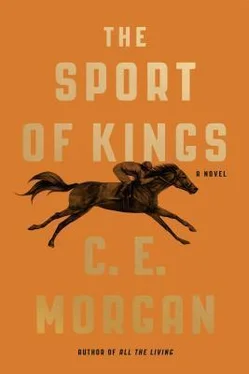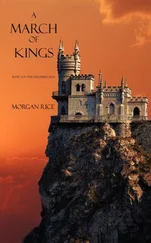Henry cringed at the thought of this man and his daughter. “Sign Monday morning in this office at nine o’clock.”
Then Allmon was moving out of the room, a light beginning to show in his mind, and there was a brief, triumphant elation. But then he realized how quiet his chest was, as if his heart had stopped beating, and he paused at the door and looked back with his hand on the knob. He said quietly, “You really hate me this much?”
“Hate you?” Henry said without looking up, his attention returned to the papers in front of him. “I don’t even remember your name.”
* * *
There is an old story of the seven hills. A great lion lived there, and he ate up other animals every day to build his strength. So the animals banded together and sent a representative, who said, “It’s not good for a great lion such as yourself to waste energy on catching food. In exchange for eating only one of us a day, we will send you your food for dinner.”
“Fine,” said the lion, “but let’s begin now.”
They did as he bid them, and they sent an antelope the first day. On the second day, they sent a goat. But the animals were all worried, because they knew it would soon be their turn.
One day it was the hare’s turn to be sacrificed. But before he went to the lion, he walked down to the river and rolled in the mud. He was filthy when he appeared before the lion.
“I’m not going to eat you!” cried the lion. “You’re dirty!”
“Oh, I did not come to be eaten,” said the hare. “I was bringing you a hare, but a great lion came, wrestled with me, and snatched it out of my arms.”
The lion was astonished. “Is there another great lion roaming my seven hills?”
“Yes,” said the muddy hare, “and if you will follow, I will show him to you.”
So he led the lion out of his lair and across the savanna to the site of a deep well. The hare pointed down into its narrow depths.
“Look!” said the hare. “The lion is there and also the hare!”
The lion looked and saw that this was indeed so. Forthwith, he jumped into the well and
* * *
It began with one bad glass of wine she was served at a fund-raiser on Main Street, a wine so corked or old that it tasted not like berry or oak but only astringent, like sake, so she held out her glass and chided the server: You offered me the dregs?
Then, two days later, she stopped at Windy Corner for lunch, and no sooner had the screen door slammed behind her than the scent — stench — of barbecued pork came rolling over her like a rogue wave. Her body had ushered her away in immediate, instinctive retreat, and she’d stood on their porch before God and Thoroughbreds until her stomach settled, and she’d been able to return inside and eat, but not the pork.
Chicken. Which is what she was vomiting down the side of the 250 in twenty minutes’ time, sickness wracking her with such suddenness and force, she had no time to pull over and could barely slow down before she was retching out the window, the truck wobbling madly between the lanes until she floored the brakes and came to rest like a shoaled boat between the road and a ditch carved by a shallow creek. Now she was scrambling from the seat, vomiting onto the tarred road; now she was leaning on the hood, expelling what felt like the insides of her insides; now she came to rest on her hands and knees on the road as the hard reckoning finally struck home.
There are no new stories, only new generations. Her nipples hurt. Her head was light and unfamiliar, unfocused, and she had been recently lain low by fatigue. For the whole of this past week, she’d been moving through her life as if under the influence of some ominous, waking sleep. She’d thought it was a result of not seeing Allmon, who’d been strangely absent all week, but then the wine had tasted bad and now—
A truck carrying an elderly couple pulled alongside her and almost before they could roll down the window, before they could say in wobbling, age-softened voices, Are you all right? Can we help you, miss? she was howling like an animal from her hands and knees, “Go away!”
Then she was pulling herself up onto unsteady legs, one hand to her clammy cheek, one hand to the white hood for what little support it could offer. She could smell her foul breath. The deepest kind of surprise flooded her, the age-old surprise of alien life, of life uninvited. She stared up at the sky, but it was unforgiving, as if even it had triumphed over her. The sun beat her face. For a moment, the defeat was gilded with excitement. She thought of Allmon, and her chest opened. Except: nothing was so simple. There was entrapment. Invaded by life, because you were born into a body with breasts and a uterus and the curse of fertility. She’d always thought pleasure was a simple thing to be had, like a meal or a conversation. She had been wrong.
She shook her head, she moaned out loud. The father … who could say? She pressed both of her palms to her enflamed cheeks. “Oh,” she said into the emptiness of her predicament, and stumbled unseeing toward the little stream, barely book-deep, walking straight through it to the white fence on the other side, disregardful of the bracing water discovering the seams of her boots. She draped her body against the upper planks of the fence, staring into the pasture in front of her.
She pressed a hand to the flat terrain of her belly, mindful of the pained irony, the flatness there a coy contradiction of the changes taking place. It left her mind spinning. Sneaky thought: Wasn’t it inevitable? The body making the body … Hadn’t this been destined to occur from the moment she had pulled Allmon over her for the first time, at first desiring him, but then desiring to give herself away with increasing fervor, day after day, week after week? But the father. Oh God. With an intensity that surprised her, she wished suddenly for her mother, for her counsel. But Judith was far away — had been far away for many years now, and the distance was more than physical.
The most tiresome question of all presented itself: What now?
She blinked rapidly, trying to clear her vision. All her life, she had trained her eye upon this, the natural world, the land she was surveying over the top plank of a fence. The numbness of shock was wearing off, and she gathered some tattered remnants of ordered thought. Because she didn’t know who the father was, her immediate impulse was to get rid of it. What on earth had come over her? She’d lost herself to some urge or some forgetting; she thought she was in love … she’d been preventing this very scenario for more than a decade, and here she had simply failed. Or. Or, she couldn’t help but think, the biological destiny of the organism is to reproduce, and she had not even mentioned a condom to Allmon and then let him lie over her; she didn’t even come half the time, and it hadn’t mattered, because … yes, just like Allmon, she wasn’t free. And then with her father, because … She shuddered. She knew with absolute certainty that there was no animal on earth less free than herself. But the question remained: What was her duty? Well, she had always said her duty was to Henry, and from that duty, she had excused herself only for pleasure. With some surprise, she realized that she had never indulged the question of what her duty to others might be. At another time, the question would have been merely an abstraction, but now the radical force of life was imposing itself, and she couldn’t suffer any sophistry. She wanted desperately to think this emergent thing was not life — and she would have argued it vehemently at one time — but now it would be only a conceit of the intellect. She knew it with her mother’s mind and an older, ancient, original mind, which was maybe the same thing. This was stupid, blunt-force life. Only women — not science — knew how the species reproduced: the next life nothing new at all but an undulation, a spillover from the abundance of the last. The earth and its living were not created in seven days by some sky god; the earth was an eternal birth canal, mediating energy in surge after surge of transmuting life. The question was not when does life begin, but does life ever end? To have not seen it before was to have lived under a veil of illusion. She didn’t want this knowledge or this change. She wanted to be left alone. Yet her want was nothing but a speck of cloud, because here it was, her estrogen rising, her progesterone rising, her uterus distending, life bending and molding her to its will, as she had always been bent to someone else’s will. They were two prisoners trapped in one body, two wills diametrically opposed. The irony was bare and bitter and unavoidable: she was a woman, so she was a slave to life. Never before had she understood the brutal actuality of life in a body she didn’t choose. She stared hard across the rise of the pasture to where a cluster of bay horses stood like statues in a grassy museum. What was her duty? Now she thought of the mountains, the prairies blanketing the earth, which she loved; she thought of mustangs in the wild and fields of bison carcasses like shed snakeskins, useless on the plains; of dull Galápagos finches and kiwis in cages; of pinhead barnacles splayed on a table in Downe, their sex organs poked and pinched; and she thought of the last tiny passenger pigeon with its foreign burden, the way it perished in bizarre servitude. She thought finally of herself. What was her wish for this endlessly replicating, wild world? That it be left alone. So what was her duty to this being and its natural wild? She realized there was no duty, only choice, and choice was the heaviest burden. Duty was for priests and other fools. So, what would she choose? She would revoke her will and permit it to be. Her shoulders slumped, her lips parting in stupefaction. The war of organic beings might do its part later, but for her there was a conflict of interest, and she was in no position to judge. She must recuse herself. Then she was on her knees again, clutching the fence post and vomiting.
Читать дальше
Конец ознакомительного отрывка
Купить книгу












